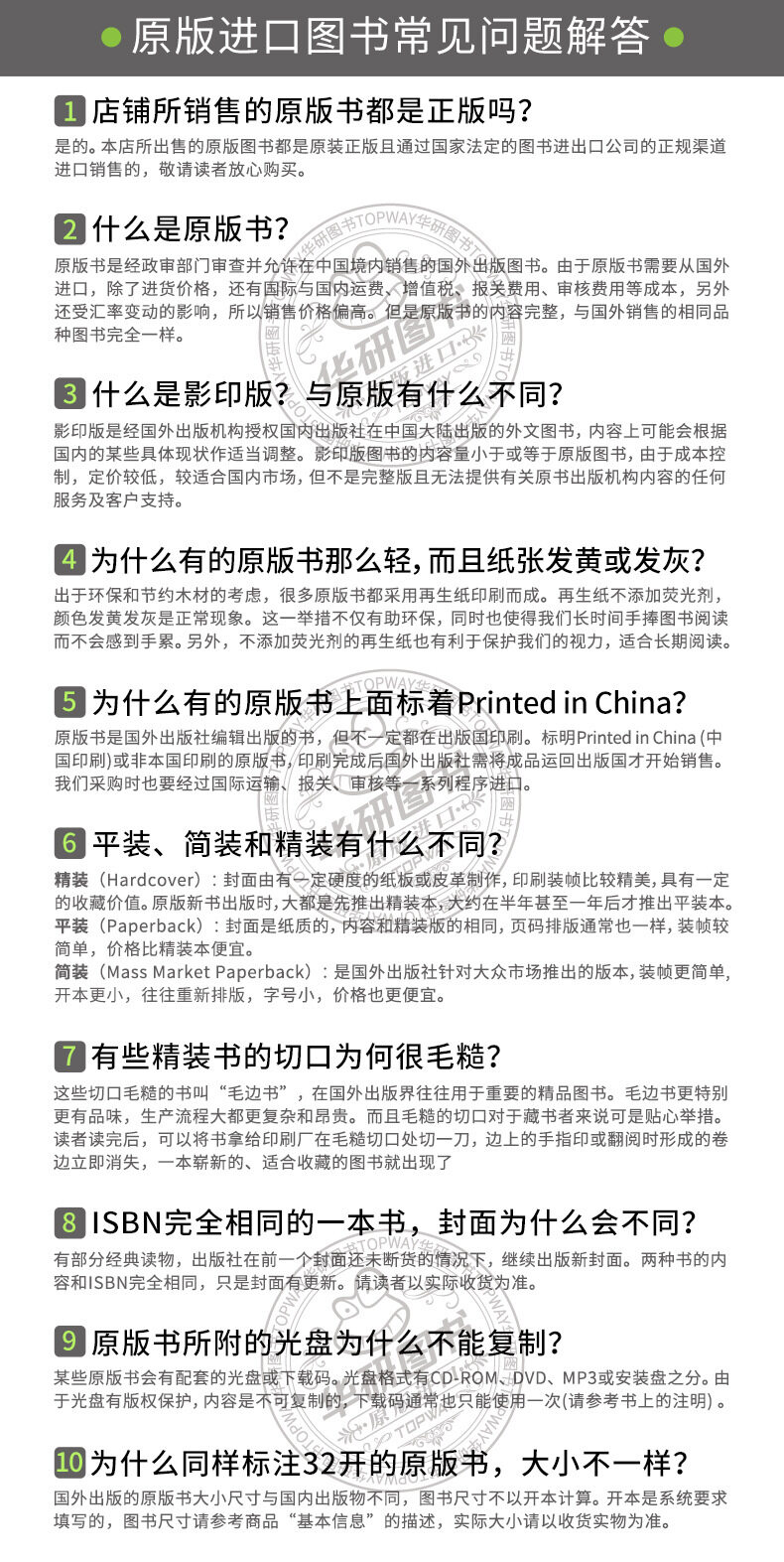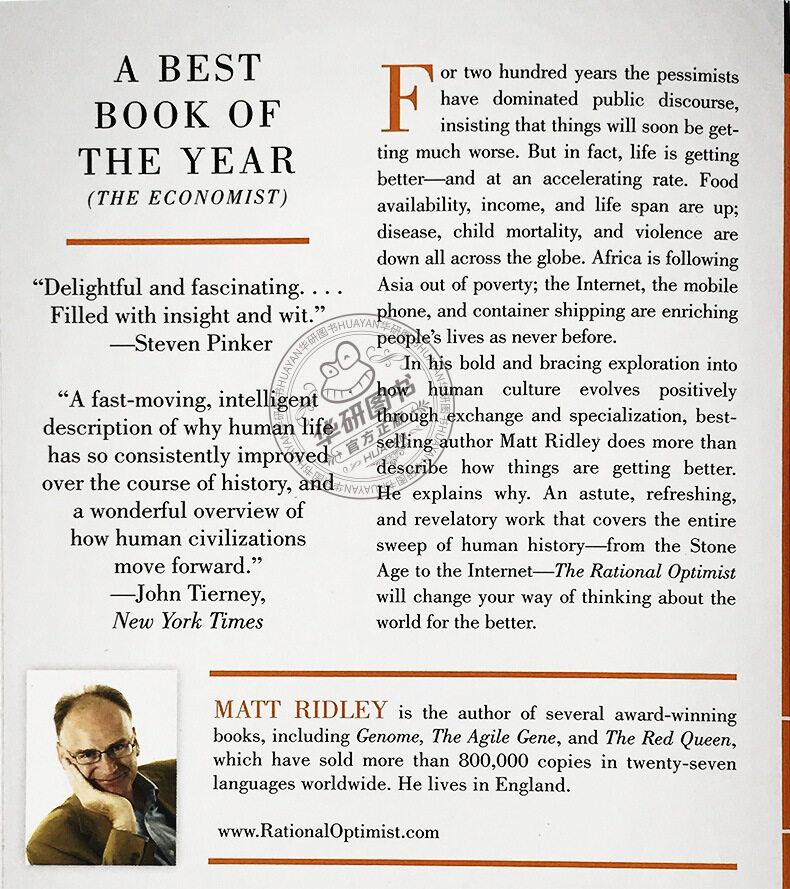
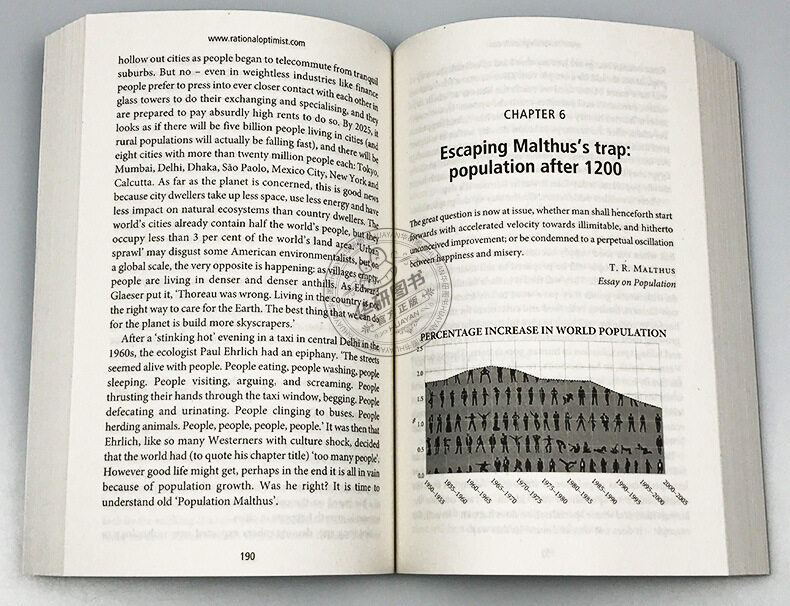
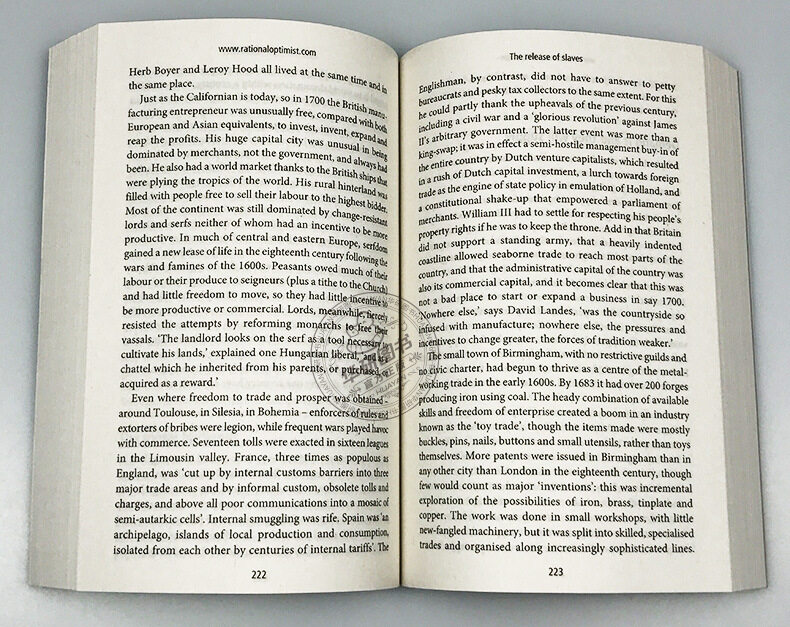
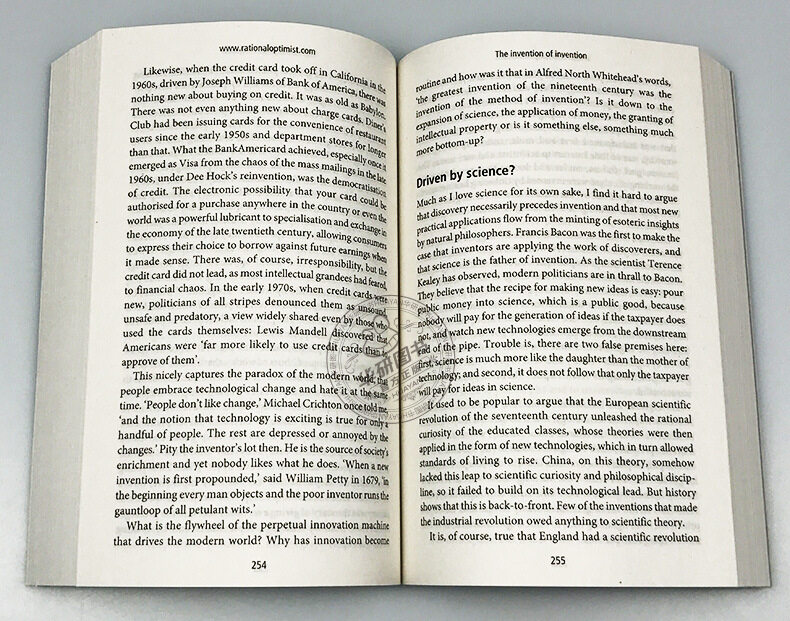

title:The rational optimist: a history of human economic progress
By Matt Ridley
Publisher Name: HarperCollins world
Publication time: 2011
Language: English
ISBN:9780061452062
Item size: 13.5 x 2.7 x 20.3 cm
Packing: paperback
Pages: 454
★ best selling representative works of Matt Ridley
★ logic thinking Luo Zhenyu grandly recommended
★ thinkers are reading - why does everything get better?
“Ridley writes with panache, wit, and humor and displays remarkable ingenuity in finding ways to present complicated materials for the lay reader.” —Los Angeles Times
In a bold and provocative interpretation of economic history, Matt Ridley, the New York Time’s-bestselling author ofGenomeandThe Red Queen, makes the case for an economics of hope, arguing that the benefits of commerce, technology, innovation, and change—what Ridley calls cultural evolution—will inevitably increase human prosperity. Fans of the works of Jared Diamond (Guns, Germs, and Steel), Niall Ferguson (The Ascent of Money), and Thomas Friedman (The World Is Flat) will find much to ponder and enjoy inThe Rational OptimistH.
The Rational OptimistRational optimists: a history of human economic progressExplained to us how the situation is getting better and better, and explained the reasons. Prosperity comes from everyone working for everyone. The habit of exchange and professional division of labor, which began more than 100000 years ago, has created a collective brain to accelerate the trend of improving human living standards. This bold book covers the whole history of mankind, from the stone age to the Internet, from the Ming Dynasty to the invention of the steam engine, from the recent population explosion to the possible consequences of climate change. Natural and man-made disasters are inevitable, but thanks to the infinite ability of human invention and creation, the 21st century is bound to achieve great economic prosperity and set a new high in natural biodiversity. This book is original, novel and enlightening, and can help you think about how to make the world a better place.
For two hundred years the pessimists have dominated public discourse, insisting that things will soon be getting much worse. But in fact, life is getting better—and at an accelerating rate. Food availability, income, and life span are up; disease, child mortality, and violence are down all across the globe. Africa is following Asia out of poverty; the Internet, the mobile phone, and container shipping are enriching people’s lives as never before.
In his bold and bracing exploration into how human culture evolves positively through exchange and specialization, bestselling author Matt Ridley does more than describe how things are getting better. He explains why. An astute, refreshing, and revelatory work that covers the entire sweep of human history—from the Stone Age to the Internet—The Rational Optimistwill change your way of thinking about the world for the better.
Matt Ridley,He is a famous popular science writer, a doctor of zoology from Oxford University, and once served as a column editor of the economist. He has written many award-winning works, including human genome, sensitive gene, red queen, etc. Currently living in the UK.
Matt Ridleyreceived his BA and D. Phil at Oxford researching the evolution of behaviour. He has been science editor, Washington correspondent and American editor of The Economist. He is the author of bestselling titlesThe Red Queen(1993),theOriginsOfVirtue(1996),Genome(1999) andNature via Nurture(2003). His books have sold over half a million copies, been translated into 25 languages and been shortlisted for six literary prizes. In 2004 he won the National Academies Book Award from the US National Academies of Science, Engineering and Medicine for Nature via Nurture. In 2007 Matt won the Davis Prize from the US History of Science Society for Francis Crick: Discoverer of the Genetic Code. He is married to the neuroscientist Professor Anya Hurlbert.
By the middle of this century the human race will have expanded in ten thousand years from less than ten million to nearly ten billion people. Some of the billions alive today still live in misery and dearth even worse than the worst experienced in the Stone Age. Some are worse off than they were just a few months or years before. But the vast majority of people are much better fed, much better sheltered, much better entertained, much better protected against disease and much more likely to live to old age than their ancestors have ever been. The availability of almost everything a person could want or need has been going rapidly upwards for 200 years and erratically upwards for 10,000 years before that: years of lifespan, mouthfuls of clean water, lungfuls of clean air, hours of privacy, means of travelling faster than you can run, ways of communicating farther than you can shout. Even allowing for the hundreds of millions who still live in abject poverty, disease and want, this generation of human beings has access to more calories, watts, lumen-hours, square feet, gigabytes, megahertz, light-years, nanometres, bushels per acre, miles per gallon, food miles, air miles, and of course dollars than any that went before. They have more Velcro, vaccines, vitamins, shoes, singers, soap operas, mango slicers, sexual partners, tennis rackets, guided missiles and anything else they could even imagine needing. By one estimate, the number of different products that you can buy in New York or London tops ten billion.
This should not need saying, but it does. There are people today who think life was better in the past. They argue that there was not only a simplicity, tranquillity, sociability and spirituality about life in the distant past that has been lost, but a virtue too. This rose-tinted nostalgia, please note, is generally confined to the wealthy. It is easier to wax elegiac for the life of a peasant when you do not have to use a long-drop toilet. Imagine that it is 1800, somewhere in Western Europe or eastern North America. The family is gathering around the hearth in the 2000s, North Korea throughout. Argentina had a disappointingly stagnant twentieth century. But overall, alter fifty years, the outcome for the world is remarkably, astonishingly, dramatically positive. The average South Korean lives twenty-six more years and earns fifteen times as much income each year as he did in 1955 (and earns fifteen times as much as his North Korean counterpart). The average Mexican lives longer nowthan the average Briton did in 1955. The average Botswanan earns more than the average Finn did in 1955. Infant mortality is lower today in Nepal than it was in Italy in 1951. The proportion of Vietnamese living on less than $2 a day has dropped from 90 per cent to 30 per cent in twenty years.